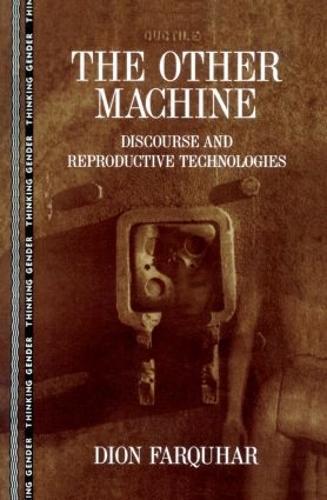Overview
With technological advances in reproduction no longer confined to the laboratory or involving only the isolated individual, women and men are increasingly resorting to a variety of technologies unheard of a few decades ago to assist them in becoming parents. The public at large, and feminists as a group, are confused and divided over how to view these technologies and over what positions to take on the moral and legal dilemmas. The Other Machine provides a rigorous analysis of contemporary feminist debates.
Full Product Details
Author: Dion Farquhar
Publisher: Taylor & Francis Ltd
Imprint: Routledge
Dimensions:
Width: 15.20cm
, Height: 1.50cm
, Length: 22.90cm
Weight: 0.500kg
ISBN: 9780415912792
ISBN 10: 0415912792
Pages: 270
Publication Date: 09 October 1996
Audience:
College/higher education
,
Professional and scholarly
,
Undergraduate
,
Postgraduate, Research & Scholarly
Format: Paperback
Publisher's Status: Active
Availability: In Print

This item will be ordered in for you from one of our suppliers. Upon receipt, we will promptly dispatch it out to you. For in store availability, please contact us.
Reviews
Farquhar's text is intellectually rigorous and provocative... -- Majia Holmer NadesanPhilosophy in Review This brilliant and visionary study steers a course between, on the one hand, the conventional Sunday supplement celebrations of reproductive technologies' miracles of modern medicine' and, on the other, the demonology of much of feminist critique whereby power and profit-hungry (male) doctors foist useless or dangerous procedures on gullible, desperate (female) patients. Farquhar argues compellingly that both discourses, mired in conventional notions of reproduction, are blind to the revolutionary potential of these technologies to transform radically our ideas of maternity, parenthood, family, and kinship . -- Sandra Lee Bartky, University of Illinois at Chicago Dion Farquhar has produced a dynamic and provocative analysis of the incredible complexity of issues, values and emotions involved in understanding and assessing assisted reproductive technologies (ARTs). Avoiding the more common course of either accepting these technologies with open arms as a means of granting childless couples a baby or rejecting them as tampering with nature, this book instead explores the ways in which these technologies open up and challenge our understanding of sexuality, reproduction, parenting and kinship. It explores with great sublety and sensitivity the liminal space between biology and science, nature and culture, and freedom and restraint. -- Elizabeth Grosz, Monash University
Farquhar's text is intellectually rigorous and provocative.... <br>-Majia Holmer Nadesan Philosophy in Review <br> This brilliant and visionary study steers a course between, on the one hand, the conventional Sunday supplement celebrations of reproductive technologies' miracles of modern medicine' and, on the other, the demonology of much of feminist critique whereby power and profit-hungry (male) doctors foist useless or dangerous procedures on gullible, desperate (female) patients. Farquhar argues compellingly that both discourses, mired in conventional notions of reproduction, are blind to the revolutionary potential of these technologies to transform radically our ideas of maternity, parenthood, family, and kinship<br>. <br>-Sandra Lee Bartky, University of Illinois at Chicago <br> Dion Farquhar has produced a dynamic and provocative analysis of the incredible complexity of issues, values and emotions involved in understanding and assessing assisted reproductive technologies (ARTs). Avoiding the more common course of either accepting these technologies with open arms as a means of granting childless couples a baby or rejecting them as tampering with nature, this book instead explores the ways in which these technologies open up and challenge our understanding of sexuality, reproduction, parenting and kinship. It explores with great sublety and sensitivity the liminal space between biology and science, nature and culture, and freedom and restraint. <br>-Elizabeth Grosz, Monash University <br>
Author Information
Dion Farquhar is a political theorist, cultural critic, poet and prose fiction writer living in Santa Cruz.




